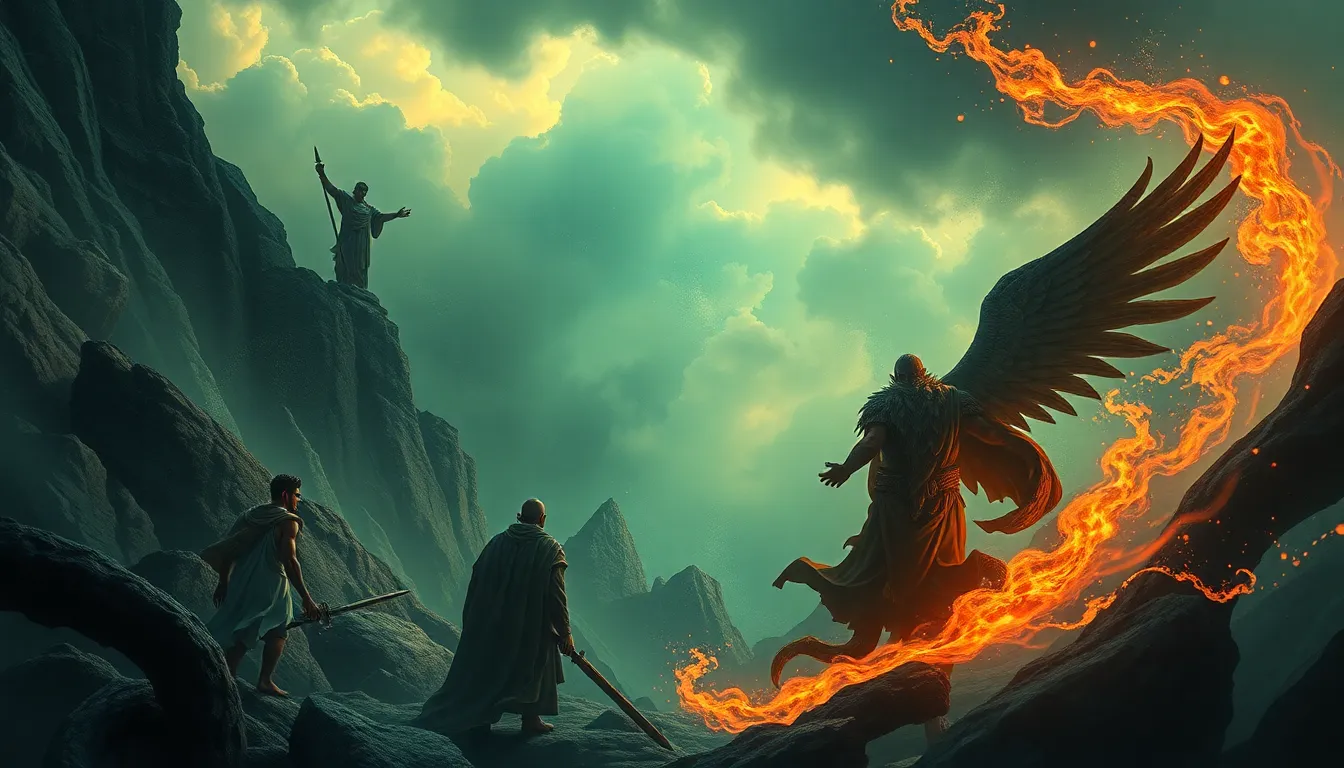The Myths That Empower: Cultural Heroes Through Time
I. Introduction
Cultural heroes are pivotal figures within societies, embodying the values, aspirations, and struggles of their people. These heroes often arise from myths, which serve as collective narratives that help define cultural identities. Myths play a crucial role in shaping societal norms, offering frameworks through which communities interpret their experiences and aspirations. This article explores empowering myths and cultural heroes throughout history, examining their significance and impact on various societies.
II. The Concept of Myth and Heroism
Myths are traditional stories that convey the beliefs and values of a culture. They often explain natural phenomena, human behavior, and cultural practices. Myths serve to connect individuals to their community and heritage, reinforcing shared identities.
Cultural heroes share several characteristics:
- Exemplary Traits: They embody virtues such as bravery, wisdom, and resilience.
- Transformation: Their journeys often involve overcoming great obstacles and personal growth.
- Relatability: They resonate with the struggles and aspirations of the people they represent.
The psychological and social impact of myths on communities is profound, offering inspiration and a sense of belonging. They provide narratives through which individuals can navigate their lives, fostering a shared understanding of identity and purpose.
III. Ancient Myths and Their Heroes
Throughout history, ancient myths have produced numerous heroes who continue to inspire. Two of the most prominent examples come from Greek and Norse mythologies.
A. Greek mythology: Hercules and the hero’s journey
Hercules, known for his incredible strength and bravery, embodies the classic hero’s journey. His Twelve Labors represent not just physical challenges but also the struggle against internal and external demons. Hercules’ story emphasizes perseverance and redemption, making him a lasting symbol of human resilience.
B. Norse mythology: Odin and the values of bravery and wisdom
Odin, the Allfather in Norse mythology, represents the duality of wisdom and war. He sacrificed an eye for knowledge, illustrating that the pursuit of wisdom often requires great personal sacrifice. Odin’s quest for understanding underscores the importance of wisdom in leadership and heroism.
C. Indigenous myths: The role of trickster figures
In many Indigenous cultures, trickster figures like Coyote and Raven challenge the status quo and teach valuable lessons through their cunning and folly. These characters embody the complexities of human nature, reminding communities of the importance of adaptability and humor in the face of adversity.
IV. The Influence of Myths in the Middle Ages
The Middle Ages saw the emergence of new cultural heroes, often steeped in legend and morality.
A. The Arthurian legends: Chivalry and the ideals of knighthood
The Arthurian legends, featuring King Arthur, Sir Lancelot, and the Knights of the Round Table, exemplify chivalric ideals. Themes of honor, loyalty, and courage are central to these stories, shaping the moral framework of medieval society.
B. Folklore heroes: Robin Hood and the fight against injustice
Robin Hood, the legendary outlaw, represents the struggle against tyranny. His tale of stealing from the rich to give to the poor resonates with the collective desire for justice and equality, making him a timeless cultural hero.
C. Religious figures: Saints as cultural heroes in various faiths
Saints such as Saint Francis of Assisi and Joan of Arc are revered not only for their piety but also for their courageous acts. They serve as moral exemplars, inspiring countless individuals to pursue a life of virtue and service.
V. Modern Myths and Contemporary Heroes
As society evolved, so did its heroes, leading to the creation of modern myths.
A. The rise of superheroes in popular culture
Superheroes like Superman and Spider-Man have become modern cultural icons, representing hope, justice, and the power of the individual. Their stories reflect contemporary societal challenges, making them relatable to audiences around the world.
B. Historical figures as modern myths: Nelson Mandela and Martin Luther King Jr.
Figures such as Nelson Mandela and Martin Luther King Jr. have become symbols of resistance and perseverance. Their legacies inspire movements for justice and equality, demonstrating how historical figures can transcend time to become modern myths.
C. The impact of folklore in modern social movements
Folklore continues to influence modern social movements. Stories of resilience and activism, from the civil rights movement to environmental activism, draw on traditional narratives that empower individuals to fight for change.
VI. The Role of Gender in Cultural Heroism
The narratives surrounding heroism have traditionally been male-dominated, but female heroes have emerged as powerful figures.
A. Female heroes in mythology: Athena, Mulan, and their significance
Mythical figures like Athena, the Greek goddess of wisdom, and Mulan, the legendary warrior, challenge traditional gender roles. They exemplify strength, intelligence, and courage, redefining what it means to be a hero.
B. The evolution of gender roles in myths and hero narratives
Over time, the representation of women in myths has evolved, reflecting broader societal changes. Contemporary narratives increasingly highlight female empowerment and agency, showcasing a more inclusive understanding of heroism.
C. Contemporary female heroes and their cultural impact
Modern figures such as Malala Yousafzai and Greta Thunberg illustrate the power of young women in shaping social discourse. Their activism resonates globally, inspiring new generations to advocate for change.
VII. The Global Perspective: Myths and Heroes Across Cultures
Hero myths vary significantly across cultures, yet share common themes of struggle and triumph.
A. Comparative analysis of hero myths in different cultures
From the epic tales of Gilgamesh in Mesopotamia to the stories of the African trickster Anansi, each culture offers unique perspectives on heroism. These narratives often reflect the values and challenges faced by their societies.
B. The influence of globalization on cultural heroes
Globalization has facilitated the exchange of cultural narratives, leading to the emergence of hybrid heroes that combine traits from multiple traditions. This blending enriches the understanding of heroism across different contexts.
C. Case studies: Global icons like Malala Yousafzai and their mythologizing
Malala Yousafzai’s story has transcended her individual experience, becoming a global symbol of the fight for girls’ education. Her mythologizing illustrates how personal narratives can resonate on a worldwide scale, empowering movements and inspiring change.
VIII. The Power of Storytelling in Shaping Cultural Heroes
Storytelling has always been a crucial mechanism for conveying hero narratives.
A. The role of oral tradition and literature in hero narratives
Oral traditions preserve the stories of cultural heroes for generations, while literature allows for the exploration of heroism in greater depth. Both forms of storytelling play vital roles in reinforcing cultural values.
B. How storytelling empowers communities and preserves culture
Stories foster community bonds and shared identities. They provide a means for individuals to connect with their heritage, ensuring that cultural values are passed down through generations.
C. The impact of digital media on the evolution of hero myths
Digital media has transformed the way hero narratives are shared and consumed. Social media platforms allow for the rapid dissemination of stories, providing a space for new heroes to emerge and for marginalized voices to be heard.
IX. Challenges and Critiques of Cultural Myths and Heroes
While myths and heroes can empower, they also present challenges.
A. The danger of idealizing heroes
Idealizing heroes can lead to unrealistic expectations and disillusionment. Recognizing the flaws and complexities of heroes is essential for a more nuanced understanding of heroism.
B. Misrepresentation and appropriation of cultural narratives
As cultures intersect, the misrepresentation or appropriation of myths can occur, leading to the dilution of their original meanings. It is crucial to engage critically with these narratives to honor their cultural significance.
C. The need for critical engagement with myths in contemporary society
Critical engagement allows individuals to unpack the values and implications of myths, fostering a deeper understanding of their relevance in today’s world.
X. Conclusion
In conclusion, myths




